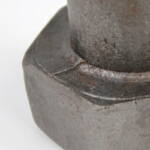Mike's FAQs
While we’ve made it very easy to submit an inquiry online, we don’t have a system that allows a purchase to be made online through a few simple clicks or an online listing of prices. Portland Bolt is a manufacturer of nonstandard construction bolts, which does not lend itself to an ecommerce site. While there... Read more
Often times, ANSI (American National Standards Institute) or ASME (American Society of Mechanical Engineers) B18.2.1 will show up on a drawing, some certification documents, and even our website . This number simply refers to dimensional standards for a variety of common bolts, such as hex bolts, heavy hex head bolts, and square head bolts. Most... Read more
AASHTO is the American Association of State Highway and Transportation Officials. This organization sets standards for highway design and construction. As it relates to bolts, often times, bolts and other materials will be shown on plans for state transportation projects as having an AASHTO designation. These AASHTO numbers typically will correlate directly to a particular... Read more
While there is certainly nothing to preclude ASTM A193 B7 from being specified for anchor bolts – and Portland Bolt manufactures them quite often – the specification is not intended for anchor bolt use. ASTM F1554 Grade 105 is a specification specifically developed for anchor bolts and possesses virtually identical chemical and physical properties. ASTM... Read more
The ASTM A449 specification is somewhat ambiguous when it comes to the marking requirements. While the requirements are perfectly clear for hex bolts and studs, the verbiage doesn’t address head styles other than hex head, other bolt configurations such as U-bolts, or rods with threads on each end. ASTM A449, Section 16.1, Manufacturers Identification reads as follows:... Read more
There are several differences between bolts intended for use in construction and more precision fasteners, such those used in an OEM application. One difference for headed bolts is the process in which the head is formed on the bolt and the resulting appearance of the bolts. Larger, construction headed bolts are typically made by hot-forging... Read more

Several ASTM specifications are followed by an “M” that denotes it being an equivalent metric standard. While there is actually an A193M Grade B7 specification which is applicable to metric fasteners, this is not the case with ASTM A193 Grade B7M. This is a different grade of material than A193 Grade B7. So how exactly... Read more
This is a question that we are asked on a regular basis, and one that we do not have a clear answer for due to the variety of factors involved in making this calculation. Anchor bolt pull out strength is the force required to pull a single bolt out of its foundation. In order to... Read more
Yes, you can. Although Portland Bolt is a manufacturer, we are not the type of company that sets up and runs tens of thousands of common, standard-sized bolts. We can, and often do, set up to make just a handful of custom construction fasteners if that is what is required. We should clarify that this... Read more
Portland Bolt supplies tie-rod assemblies with clevises and turnbuckles on a regular basis. However, in most instances, we do not provide the clevises and turnbuckles unless we are manufacturing the rods. There are a couple of key reasons for this. Probably the most important reason is that when we provide all the components of the... Read more

